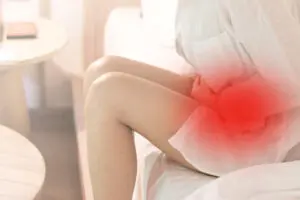Endometriosis is a confusing condition with various symptoms, no symptoms, or severe symptoms. It’s not always easy to diagnose, leaving many women to suffer with pelvic pain and other unpleasant symptoms for years. Here are six signs you may have endometriosis.
The Illusive Condition Of Endometriosis
When the tissue lining of your uterus grows outside the uterus, this is known as endometriosis. It can grow on your reproductive organs like your ovaries, your bowel, or on the tissues lining your pelvic area.
Each month the hormones controlling your menstrual cycle irritate those misplaced tissues causing a myriad of symptoms. As time passes, the tissue will grow, thicken, and break down. When it does break down, it becomes trapped in the pelvis which leads to all kinds of symptoms.
Extremely Painful Periods
This very common symptom of endometriosis is due to the displaced endometrial tissue which swells and bleeds just like the uterine lining. Since it is not in the uterus, it becomes difficult to shed. Thus, many women have atypical sharp and stabbing pains during their period.
Painful Sexual Intercourse
With endometriosis you may not feel any pain upon entry, but it will become quite painful with deep penetration. Talk with Associates In Womens Health if this is becoming a problem.
Chronic Pain
Unfortunately, endometriosis can cause pain not only during your period. The endometrial tissue touching the bladder, uterus, vagina or rectum can lead to lower back pain or pain anywhere in your pelvis. It might get worse during your period, but it might be ongoing even when you aren’t menstruating.
Excessive Bleeding Or Bleeding Between Periods
If you are experiencing very heavy bleeding leading to soaked tampons and pads within an hour, and if you are passing large blood clots for bleeding for more than a week, talk with Associates In Womens Health. If it continues you may become anemic.
Difficulty Urinating Or Having Bowel Movements
An endometrial tissue near or within your bladder or bowel can cause difficulty urinating or passing bowel movements. If you become constipated or see blood in your stool, or if you have the urgent need to pee during your period, these could be signs of endometriosis.
Difficulty Getting Or Staying Pregnant
Endometrial implants on the reproductive organs can prevent fertilization. In fact, half of women who cannot get pregnant discover they have endometriosis. If you have been trying to get pregnant for over a year with no success, talk with your physician if endometriosis is the problem.
Endometriosis is confusing because some women can have a minor case and yet have severe symptoms. The opposite can be true as well. Don’t suffer in silence!
If you are experiencing any of the symptoms of endometriosis, contact Associates In Womens Health at (402) 697-7200, or request an appointment online, for an evaluation and treatment.

